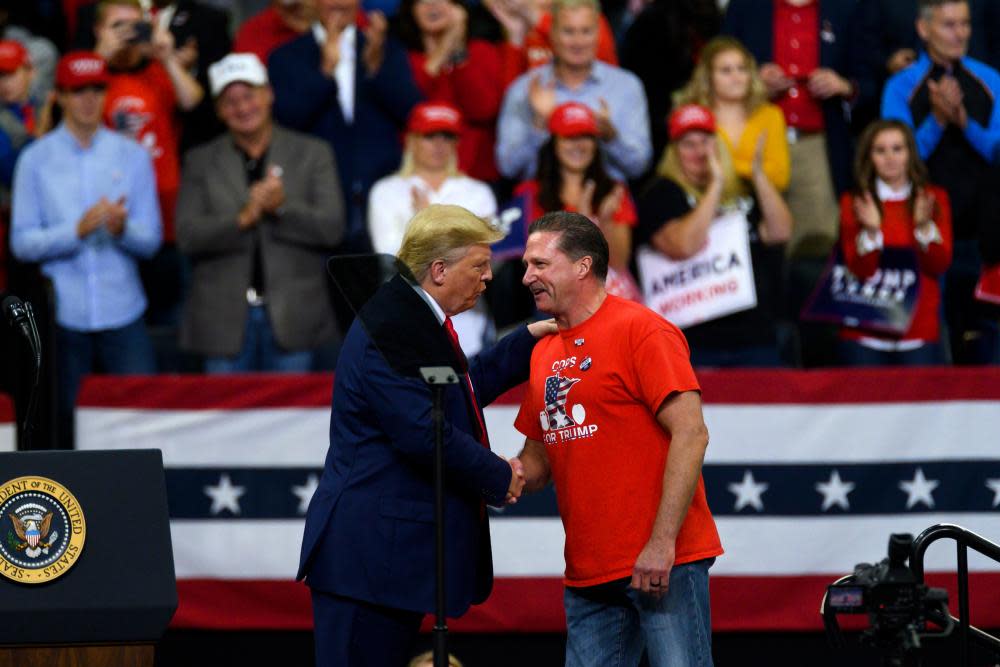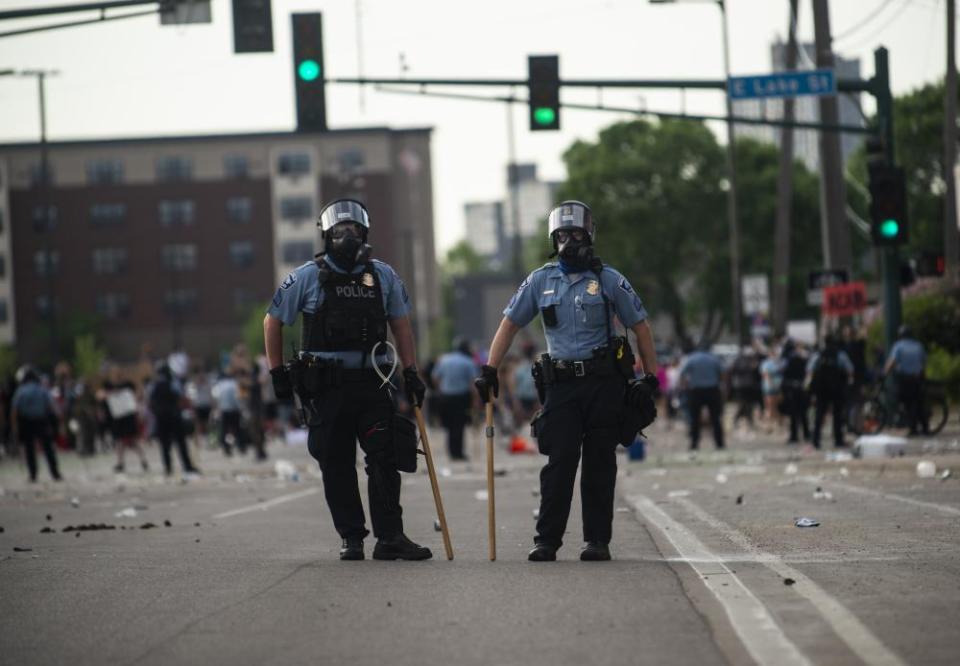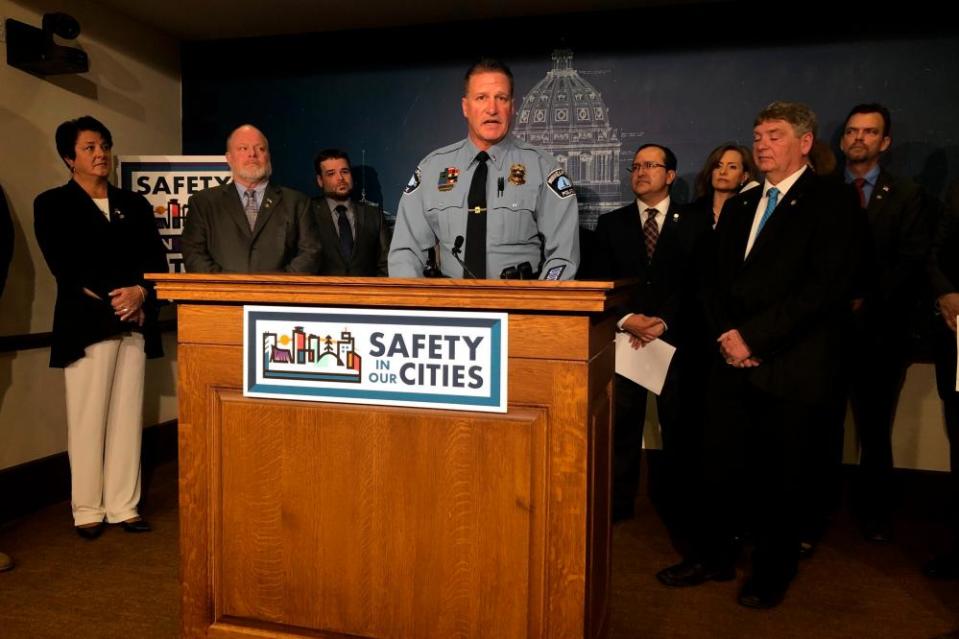Hopeful that Minneapolis policing will change? Meet the police union's chief ...

Amid the worst civil unrest in the US in half a century, there have been notably few Americans willing to speak up on behalf of the man who lit the fuse: Derek Chauvin, the now former police officer charged with the murder of George Floyd in Minneapolis.
The video of Chauvin kneeling on Floyd’s neck for nearly nine minutes seems too clear-cut and painful to try to make excuses.
Step forward Bob Kroll, leader of the Minneapolis police union. Kroll wrote to his members this week describing Floyd as a “violent criminal” because he did prison time, in an apparent attempt to imply Chauvin’s treatment of an unarmed man being arrested on suspicion of a non-violent minor crime was legitimate. The union chief also described those protesting over Floyd’s death as terrorists, and the dismissal of Chauvin and three other officers facing charges as depriving them of their rights.
Related: George Floyd memorial: lawyer says 'pandemic of racism' led to killing
A former Minneapolis police chief, Janeé Harteau, who battled Kroll in attempting to reform a department with a long history of racial abuse, quickly hit back, saying he was unfit to be a police officer and calling on him to resign from the force.
“A disgrace to the badge! This is the battle that myself and others have been fighting against. Bob Kroll turn in your badge!” she wrote on Twitter.
That will not have bothered Kroll. By Harteau’s own admission, the union chief is in many ways more powerful than the police chief in Minneapolis – as is the case in many other cities across the US.
The union fought me at every turn"
Janeé Harteau, former Minneapolis police chief
“The police federation has historically had more influence over police culture than any police chief ever could,” said Harteau. “I was fought at every turn from bringing body cameras to the police department to having implicit bias training to professional development processes and having some more consistency in promotions.”
That power of the union (or federation) has often stood in the way of reform, perpetuating old-school racialised policing tactics and shielding officers from accountability.

Harteau attempted comprehensive reforms as police chief for five years until 2017 after inviting the US justice department to examine the conduct of the Minneapolis police. The result was a strategy, MPD 2.0 A New Police Model, that put a strong emphasis on community engagement, transparency and public accountability. Harteau said it was consistently resisted and subverted by the union.
She said that when she also attempted to address issues around burnout and mental health of police officers, and to institute an early warning system to flag up those prone to abuse, the union characterised the measures as no more than a way to discipline officers and blocked them.
Former Minneapolis mayor RT Rybak said the 800-strong police union stood in the way of attempts by successive administrations to change policing culture toward African Americans and other minorities.
“I would say the last five mayors are very different people, but every one has been deeply committed to reforming the police department. Every one of them. Collectively we have failed to move enough of the levers of change,” he said.
Jacob Frey, Minneapolis' mayor, has said the union has resisted all his reforms
Mayor, Jacob Frey, was elected on a promise to reform the police department, with a strong emphasis on community policing. But he has said the union has resisted all such change. In addition, Frey said he is “hamstrung by the architecture of the system” of the union contract and arbitration which makes it difficult to discipline and dismiss officers for abuses.
The single largest obstacle, said Ryback, is Kroll and his leadership of the federation that is resistant to any change away from a style of policing that minority communities in Minneapolis describe as acting like an occupying force.

Kroll makes no secret of his taste for old style police tactics and courts controversy. Last year he appeared at a campaign rally with Donald Trump and praised him as a “wonderful president”.
“The Obama administration and the handcuffing and oppression of police was despicable,” he told the rally. “The first thing President Trump did when he took office was turn that around … and decided to start letting the cops do their job; put the handcuffs on the criminals instead of us.”
Kroll was wearing a “Cops for Trump” T-shirt his union started selling after Frey barred officers from wearing uniforms at political events. Kroll has been openly hostile to Black Lives Matter, calling it a “terrorist organisation”. In 2016, he commended four Minneapolis police officers who walked out of a professional basketball game because players were wearing Black Lives Matter warm-up jerseys.
Kroll wore a 'Cops for Trump' T-shirt at his rally and called him a 'wonderful president'
Before he was federation chief, Kroll had a long record of disciplinary actions against him. He was suspended in 2008 with a fellow officer, while out of uniform and without identifying themselves as police, for beating a man in the street and then having him arrested on false charges. Kroll has also been suspended for using a homophobic slur to describe a gay aide to the then mayor, Rybak.
This week, Kroll was critical of the current Minneapolis police chief, Medaria Arrandondo, who is African American, for immediately firing Chauvin and three other officers since charged in Floyd’s death.
The pair have a long history. In 2007, Arrandondo named Kroll in a lawsuit against the police department accusing it of racial discrimination. Arrandondo and four other black officers alleged that Kroll made racist statements in front of senior officers and “wears a motorcycle jacket with a ‘White Power’ badge sewn onto it”.
The lawsuit also alleged that Kroll said then congressman Keith Ellison, who is black and a Muslim, “is a terrorist”. At the time Ellison, who is now Minnesota’s attorney general in charge of the Floyd investigation, was pushing for reform of the police department.
The officers alleged that the force “has a history of tolerating racist and discriminatory remarks by its white police officers and engaged in discriminatory conduct against its African American police officers”.
The majority of officers I know don’t support this racially-charged head of their union"
RT Rybak, former Minneapolis mayor
The action was settled for $800,000 and a promise of change.
Rybak said he does not believe Kroll’s views are representative of most officers on the Minneapolis force. “The majority of officers I know don’t support this racially-charged head of their union. But unless they stand up and speak out against him, we cannot make progress. That’s why I took Kroll on very publicly and very strong because we need to help give some guts to these very good officers on the force who are allowing a minority of officers to not only ruin their culture but literally endanger their lives,” he said.

The former mayor said officers believe Kroll will stand up for them no matter what when they see themselves as constantly under attack from the public and politicians.
Harteau said the siege mentality within the force is not helped by a public swift to criticise officers when they are wrong but which rarely stands up for them when they are right.
“If the public can never be vocal in support, and the only thing you see is we can be vocal in our opposition or in terminations or discipline, then officers are going to look to the union for protection whether it’s legitimate or not,” she said. “I used to say you could kill somebody and the union would protect you. Well, that’s exactly what’s happened.”
Harteau has personal experience of prejudice within the Minneapolis police department. She was the first lesbian appointed as a police chief in the US.
As a junior officer 25 years ago, colleagues did not hide their antipathy.
“In the mid-90s. I actually walked off the job because of being in a hostile work environment,” she said.
Harteau said she had another female officer as her patrol partner and male police officers would fail to back them up when called and cut their radio transmissions. She sued the department and won.
Before Rybak became mayor he had been a journalist on the city’s newspaper, the Star Tribune. “I started off as a reporter covering police officers bashing into gay bathhouses and humiliating residents,” he said.
As mayor he was determined to do something about the culture of homophobia. Rybak appointed Harteau as police chief. That alone sent a message. He said she changed the culture of the city’s police department to one of the most gay friendly in the country.
The appointment of an African American chief to succeed Harteau in 2017 was a sign of progress on race. But in recent years the push to change the culture has been complicated by the increased militarisation of the police across the country.
Rybak said that after 9/11 there was “an open federal check book” as homeland security turned police forces into security agencies, and to buy powerful weapons and surplus military equipment from the US army after it pulled out of Iraq.
Harteau said that the circumstances of Floyd’s death led her to question what she had been able to achieve as police chief.
“I would say my administration probably with 100 percent certainty made more proactive progressive changes than any other administration yet this incident still occurred, which makes me really question everything I thought I knew,” she said.

